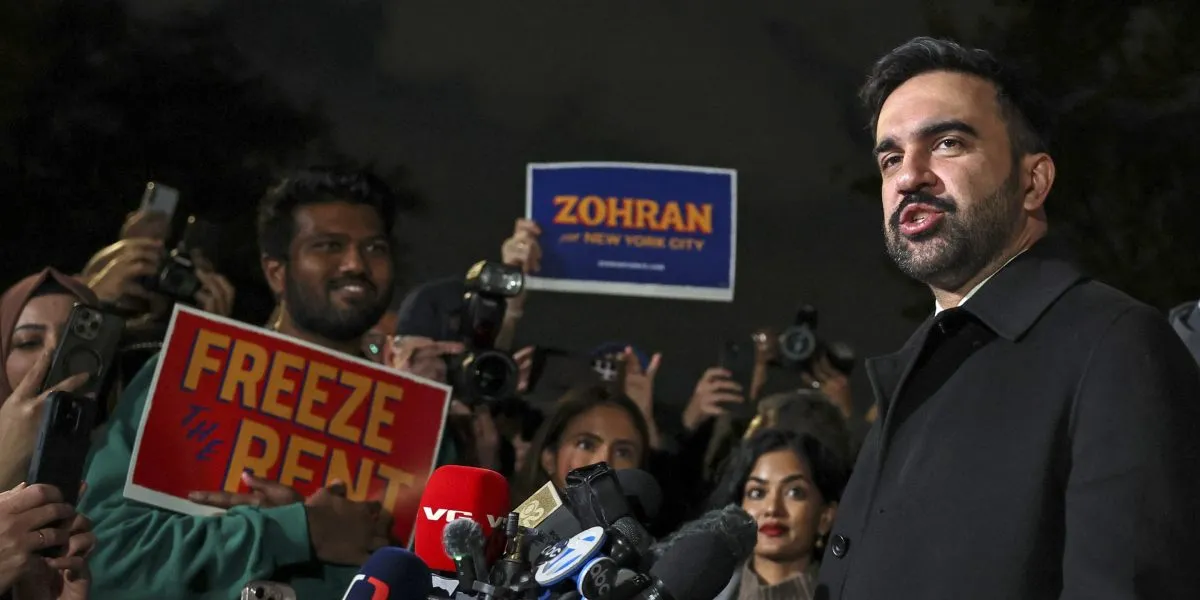
As the New York business landscape undergoes significant changes, several pressing issues are on the radar for local enterprises. One of the most talked-about topics is tax hikes. Mayoral candidate Mamdani has proposed raising $10 billion through a 2% income tax surcharge on salaries exceeding $1 million. Additionally, he aims to increase the state’s top corporate tax rate to 11.5%, revamping procurement practices and collecting nearly $700 million that the city is owed. However, it’s important to note that Mamdani himself has acknowledged that the majority of these proposals depend on legislative action beyond his authority.
The potential for a business exodus looms large as prominent figures like Dave Portnoy from Barstool Sports have threatened to relocate their headquarters from New York City if Mamdani is elected. This move could impact approximately 300 jobs. On the other hand, Jamie Dimon, CEO of JPMorgan, which employs around 24,000 people in the city, has expressed a willingness to support Mamdani or any future mayor. "We survived Mayor Bill de Blasio," Dimon remarked, emphasizing that "New York will survive."
Another significant proposal from Mamdani involves the establishment of city-run grocery stores in every borough. To assess the feasibility of this plan, it's worth consulting industry experts like John Catsimatidis, the owner of Gristedes and D’Agostino Supermarkets. Opening a government-run grocery store with slim profit margins in a city already recognized for equitable access to groceries appears to be a challenging endeavor. Catsimatidis has even threatened to shut down his stores if Mamdani wins, potentially revisiting his earlier offer to run a store for the mayor.
Mamdani's promise of a rent freeze for 2 million New Yorkers residing in rent-stabilized apartments could translate into higher rents for others. This, coupled with anticipated tax increases, has sparked renewed interest in real estate in the city's affluent suburbs. However, the issue of affordability remains critical, as CEOs have indicated that the rising cost of living makes it increasingly difficult to attract top talent to the city, particularly in sectors like fashion and advertising that cannot match Wall Street's lucrative salaries.
Generation Z in New York is becoming increasingly frustrated with soaring housing costs and limited career opportunities, fueling a desire for change. This discontent is not unique to New York; however, it raises concerns among CEOs about the next generation's trust in business and government. If Mamdani can successfully inspire civic engagement among young New Yorkers, it could create a positive ripple effect for the city as a whole.
For those interested in discussions about the future of work, be sure to join my colleagues Geoff Colvin and Sheryl Estrada on Thursday, November 13, from 11:00 AM to 12:00 Noon ET. They’ll be joined by Deloitte’s Global AI Leader Nitin Mittal and INRIX CFO Thadd Stricker to explore the topic of “Optimizing for a Human–Machine Workforce.” You can register for the event here.
In other news, OpenAI has made headlines by striking a deal with AWS, leading to Amazon shares closing at a record high after agreeing to purchase $38 billion worth of AWS capacity. This move indicates that OpenAI is diversifying its partnerships beyond Microsoft.
In a significant development, Norway’s sovereign-wealth fund has rejected Elon Musk’s proposed $1 trillion pay package, citing concerns about its overall size and potential dilution.
In the retail sector, Starbucks is selling a 60% stake in its China operations to Boyu Capital, while maintaining ownership of its brand in the country. The U.S. coffee giant has faced challenges in China due to sluggish consumer spending and rising competition.
Meanwhile, Kimberly-Clark has announced plans to acquire Kenvue, the parent company of Tylenol, for $40 billion as part of a strategic effort to revitalize its business. However, investors are cautious due to potential lawsuits linked to Tylenol’s safety claims.
Lastly, tens of millions of Americans will receive only partial SNAP payments for November due to the ongoing government shutdown, affecting approximately one in eight families in the U.S.
In the financial markets, S&P 500 futures have fallen by 1.37%, following a previous session that closed up by 0.17%. The STOXX Europe 600 index has also decreased by 1.51% in early trading, while the U.K.’s FTSE 100 is down by 1.22%. Other global indices, including Japan’s Nikkei 225 and India’s NIFTY 50, have similarly experienced declines.
As we navigate these complex issues, it's crucial to stay informed about the evolving business landscape and the various factors impacting local and global economies.